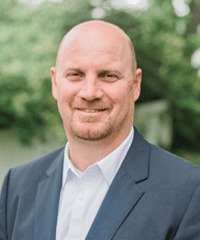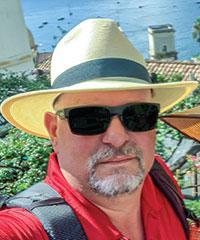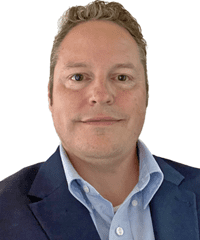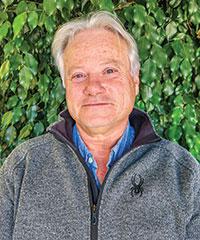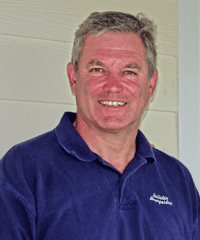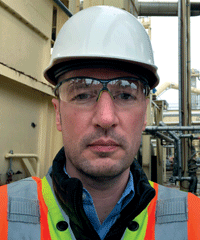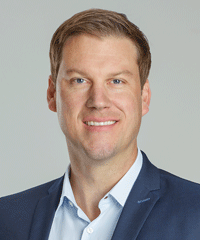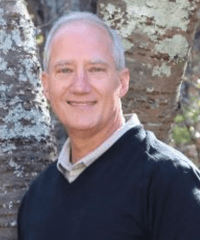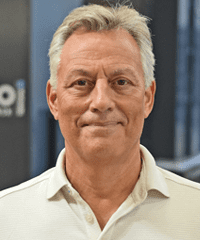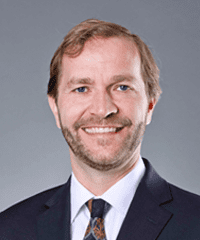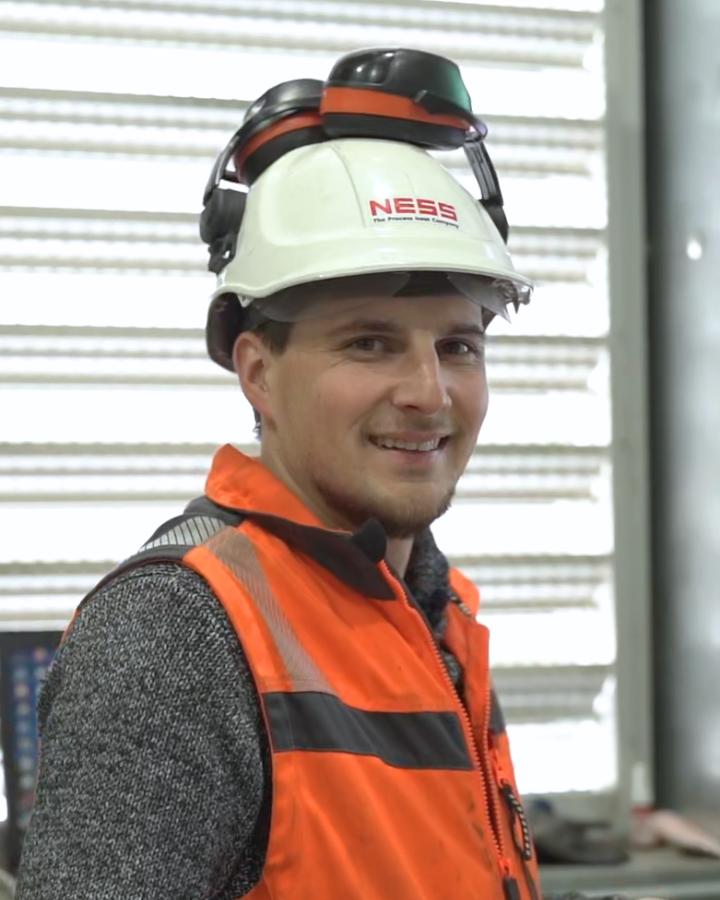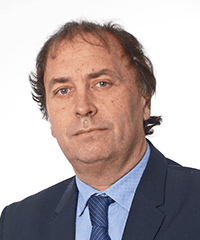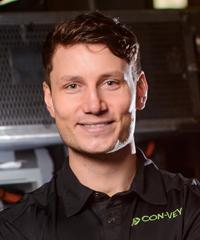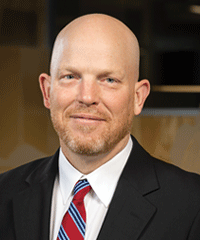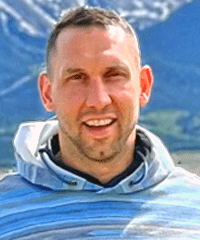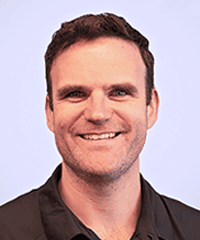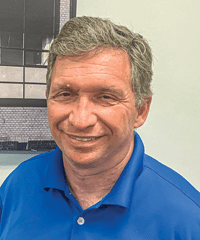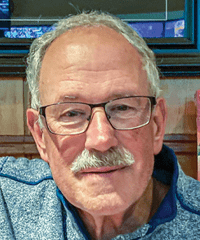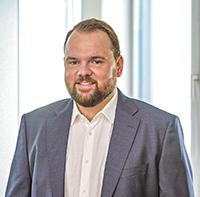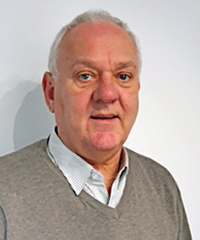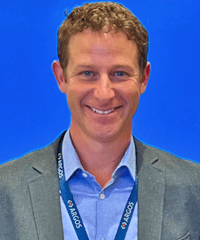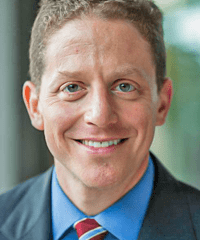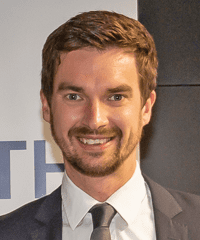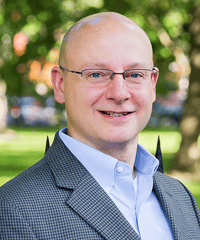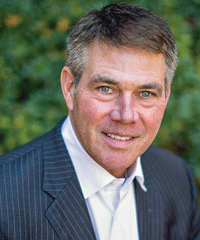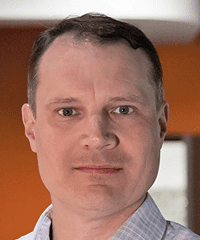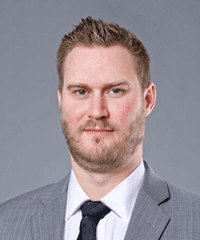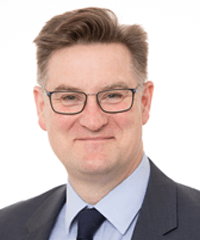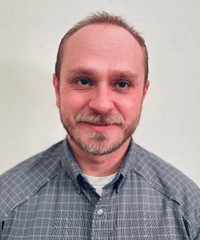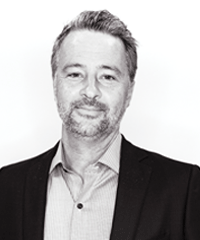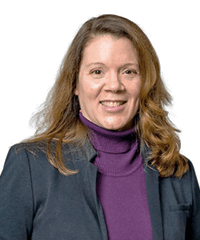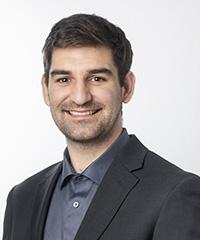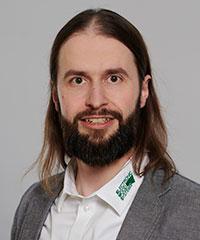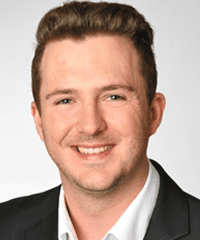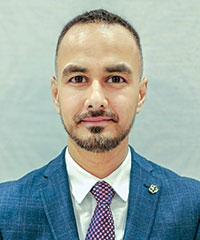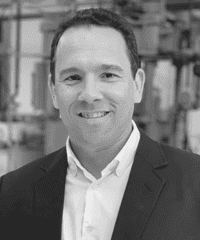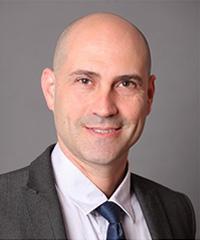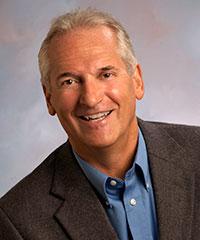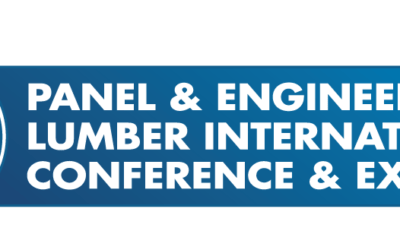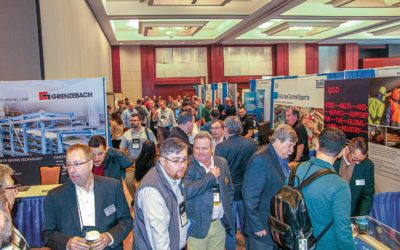PELICE 2024
March 14-15, 2024 | Atlanta, GeorgiaThe Educational Event for the Worldwide Wood Products Industries Including Veneer, Plywood, OSB, MDF, Particleboard, Engineered Wood Products, Mass Timber and Value Added
2024 Presenters
Karl Aicher
Director Project Engineering
Grenzebach
Wood Fiber Insulation Batts: Properties, Use and Production Process
This presentation will explain what wood fiber insulation is, the physical properties of WFI, how it compares to other insulation materials, where it’s used in buildings and how it is made—from wood chips to batts.
Scott Araujo
Project Manager
Schrader
Residue-Free Wastewater Recovery in the Wood-Based Panel Industry
Saving fresh water by using the water pressed in the defibrating process out of the fibers and reusing as process steam in the wood-based panel industry.
Richard W. Baldwin
Chief Investment Officer
Oak Creek Investments
North American Engineered Wood Products: Current Status and Future Potential
Major transformative changes infrequently occur within the conservative forest products industry. Plywood, OSB and LVL were created decades ago by entrepreneurs looking to solve problems. These engineered wood products (EWP) have become billion dollar industries in North America and worldwide. In recent years, a new wave of creativity has started to transform EWP manufacturing as Cross Laminated Timber (CLT) and Mass Plywood Panels (MPP) become accepted building materials in North America. These innovations respond to the growing need for innovative, functional, and easy-to-use construction products that provide comfortable living spaces, respect the environment, and alleviate the shortage of affordable housing. This presentation addresses topics such as: societal factors that create a need for better solutions to the housing shortage; brief overview of the EWPs in use for many years; analysis of relatively new EWPs including CLT and MPP; how innovative engineered wood products and processes can solve problems better than existing solutions; the non-financial benefits of wood building materials to the wellness of people and the environment.
Bob Breyer, Sr.
Manager Research & Development
Bakelite Synthetics
A Novel Approach to Process Modeling That Is Applicable to Plywood and Other Wood Products
Current process modeling relies on low variability of input data. This approach is not viable in many processes, especially plywood, due to the inherent wide variation of substrates and processes. The new approach to be discussed uses population distributions to account for variation and still be able to make actionable predictions.
Timothy Chaffee
Business Director
Wanhua Chemical (America) Co., Ltd.
Closing Technological Gaps of Isocyanate Wood Binders
While polymeric methylene diphenyl diisocyanate (PMDI) binders for composite wood products could be considered mature technology, a significant portion of the market continues using formaldehyde-based binders due to a perception that PMDI cannot work for them. Wanhua continues to innovate in the wood binder space and has closed many of the technological gaps that limit PMDI as an option for any composite wood products producer. Three of these innovations are discussed—fast-cure PMDI, PMDI accelerator, and PMDI tackifier. Fast-cure PMDI binder (WANNATE 9131FC) can be used to manufacture more sustainable molded wood pallets at 50% higher production rate with 54% lower thickness swell for improved water resistance and 133% higher static load compared to pallets made with urea-formaldehyde binders. Wanhua’s PMDI accelerator (WANOL C3110) can be used with standard PMDI binder to increase line speed 10-20%, or it can be used to maintain line speed at reduced press temperatures. Lastly, many of the world’s particleboard manufacturing lines cannot operate without tack (or green strength) in the pre-pressed fiber mat. Adding Wanhua’s tackifier (WANALYST KC367N) along with standard PMDI binder improves tack from 3 cm to 20 cm, giving the fiber mat the tack needed to traverse the manufacturing line from formation to hot pressing.
Daniel Chastenais
Vice President Sales & Marketing
Tanguay Machinery
Optimize Your Mill Infeed with Electrical Knuckleboom Loaders
This presentation will feature electrical knuckleboom loaders and show examples of various OSB and sawmill installations providing and creating ideas to increase mill infeed, improve reliability and safety. Will also present the benefits of using electrical power in lieu of diesel to reduce cost and environmental benefits.
Devon Dartnell
Director of Forest Services, Utilization & Marketing
Georgia Forestry Commission
Utilizing Mass Timber in Commercial Construction in Georgia
Commercial buildings in Georgia are typically built with steel and concrete. Structural wood panels and beams called “Mass Timber” made from small dimensional lumber provide the safety and performance of conventional materials and are cost competitive, local, renewable, & store carbon. Georgia grows much more timber than we use and our sawmills have the capacity to produce more lumber. The Georgia Legislature recently passed a voluntary law incentivizing the use of sustainable building materials like mass timber in commercial buildings built in Georgia. Georgia law authorizes the State to issue carbon credits to builders who use mass timber in place of non-sustainable materials in the construction of commercial buildings in Georgia. Using mass timber drastically reduces carbon emissions caused by the extraction of raw materials and the manufacturing of steel and cement. Additionally, the carbon in the lumber is stored for the life of the building. Using mass timber is a win for tree farmers, sawmills, the environment, and the occupants of the mass timber buildings. I will present the advantages of using mass timber over conventional building materials, describe the Registry protocol and the carbon credits it issues promoting using sustainable materials.
Jaymie Deemer
President
Nestec, Inc.
Air Emission Systems for Panelboard Presses
Air emissions from panelboard press vents contain VOC’s, HAP’s, PM and other pollutants such as wax and resins that require special handling for the air pollution control system. There are several considerations when choosing the right technologies to handle these emissions and important features needed to ensure the system maintenance requirements are low.
Christian Dieffenbacher
CEO
Dieffenbacher
Future-Oriented by Tradition: How 150-Year-Old Family-Owned Dieffenbacher Is Driving Digitalization and Sustainability in the Wood-Based Panels Industry
Under the motto “150 years of transformation on solid ground,” German family-owned Dieffenbacher, a leading manufacturer of press systems and complete production plants for the wood-based panels industry, celebrated its 150th company anniversary in 2023. One of the threads that run through the company’s history is transformation. Dieffenbacher presses transform a wide variety of materials into useful products, while Dieffenbacher the company has permanently transformed itself to help industry and society address increasingly complex challenges. Among those challenges is the careful use of the earth’s valuable resources. Sustainability has already been part of Dieffenbacher’s strategy since 2019 and is one of its most important corporate goals. Another complex challenge is digitalization. Introduced in 2021, Dieffenbacher’s digital platform EVORIS has long since successfully established itself on the market with more than 20 references worldwide.
Cory Elliott
Senior Project Manager
Crow Engineering
The Future and the Fundamentals
Technological advancements have created opportunity for transformative change in our industry. Adopting AI based control systems will enable human like responses to the process, a constraint that has limited automation in the past. With this opportunity comes warning, knowledge of, and adherence to, process fundamentals will be evermore important to capture the opportunity these technologies create. Crow Engineering and their AI partner RIOS’ approach to plant modernization embeds this thinking in their designs, seeking first to provide solutions that work, enhance process tolerances, and enable operators to move into more supportive roles.
Johnnie Erichsen
Senior Sales Manager
Tentoma
100% Waterproof Packaging of Panels While Reducing Film Consumption
Tentoma will introduce you to RoRo StretchPack packaging. Using the RoRo StretchPack technology, panels are packed inside a tubular stretch hood film. During the packaging process, the stretch hood film contracts and adapts to the panels, while the film is sealed on both ends. This provides 100% waterproof packaging in one operation. It is a film-saving alternative for packaging lines using heat shrink and orbital wrapping.
Lorne Fardy
Director, Product Development
Kadant Carmanah Design
Using Smart-Connected Technology to Improve Stranding and OSB Production
Very little attention is dedicated to tracking and analyzing the log stranding process in an oriented strandboard (OSB) mill. Decisions about how to set up, operate and maintain a strander and its components are traditionally influenced by the quality and throughput seen downstream at the press. To help green end production managers gain more visibility across their stranding operation in real-time, Kadant Carmanah has developed, installed, and thoroughly field-tested ARGUS condition monitoring sensors and camera systems for the SmartRING strander. This presentation highlights what we at Kadant Carmanah are learning based on the data we are collecting, as well as the significant impact we are seeing in how smart-connected technology is helping green end production managers optimize the productivity, efficiency and profitability of their stranding operation.
Tim Fuchsloch
Service Manager North America
Ness
Reducing the Total Cost of Ownership (TCO) of Thermal Oil Systems in the Wood-Based Panel Industry
Thermal oil plants are essential to provide process heat to various applications in the wood-based panel industry, especially for press systems. Lifecycle optimization is mandatory to operate thermal oil systems as cost-efficiently and safely as possible. This presentation addresses topics such as increasing efficiency through air preheating, safety improvements with pump monitoring, and maintaining oil quality at a high level with the help of modular units (easy to retrofit).
Paul Gavin
Sales Manager (North America)
Biele Group
Digital Solutions and Production Control in Press Lines
Biele Group, by means of its Biele Digital company is integrating digital solutions and capturing process data, turning them into valuable insights, to improve efficiency of the lines, minimizing rejects and allowing a more accurate and controlled production. These solutions are especially interesting in those lines where presses are included and accurate control of each pressing parameter is key for a proper final product. Biele will show practical examples where the different solutions offered by Biele Digital are being used.
Jeremy Goebel
Vice President
Con-Vey
The Automatic Panel Repair Line Journey from Weyerhaeuser Kalispell—Latest Technology and Real-Life Experience
This presentation will take you into the the latest technology regarding automatic panel repair operation while looking at a real-life experience – the journey from Weyerhaeuser Kalispell in Montana who installed an ARGOS/CON-VEY panel repair line back in December 2021, as the pandemic was hitting the country. During this presentation, you will hear about the real results obtained, the learning from this project, and all the benefits from this technology.
Stuart Gray
CEO
Roseburg
Looking Back to Look Forward: The History and Future of Roseburg Forest Products
Stuart addresses how the history of Roseburg illuminates its future. Key strengths that enabled the company to survive and thrive over the decades pave the path to continued growth and making more lives better from the ground up.
Benjamin Hackbart
OEM Sales
Dürr Systems
Optimizing Your APC $ystem
Your air pollution control system can be costly to continue to operate as it ages, especially if poorly maintained. There are several main components that if addressed can result in big savings that will aid in minimizing emissions while also reducing operating costs. Walking through and taking a deeper dive into each component will help to identify common issues that will result in a quick return on your investment.
George Harmati
Technical Sales Manager
Westmill
Advancements in Dryer Technology
The presentation will focus on new technologies and innovations that improve the operation of veneer dryers. These technologies are included on new veneer dryers and can be retrofitted onto existing veneer dryers. Topics covered: dryer emission and humidity control system for increased production and improved veneer quality; bearing vibration monitoring to increase dryer uptime; dryer component design improvements to ease maintenance and personnel safety and eliminating the infeed hydraulic power unit to save energy, reduce fire risk and increase dryer uptime.
Todd Havican
Sales Director
Fagus GreCon
Emerging Technologies in Spark Detection and Extinguishing
This presentation includes a review of new technology in spark detection and extinguishing, highlighting what this new technology does to better protect facilities.
Topics to be covered include
1) Types of ignition sources and types of detectors that should be used to detect these sources
2) New Detector – Intelligent DLD 1/9 spark detector and how this detector uniquely can detect the spectrum of ignition sources: mechanically generated sparks, burning material, hot particles and smoldering nests
3) Extinguishment Process – discussing the importance of spraying patterns, calculations of distance from detection and the amount of water to be used
4) New Intelligent Extinguishment Module (IEM) that helps predict maintenance to keep systems safer and more reliable – optimizing maintenance costs.
Steve Jaasund
Senior Product Manager
LDX Solutions
Emission Requirements for the Wood Products Industry—What Will the Future Bring?
The engineered wood products industry is a young industry. Its growth since World War II has been in parallel with the growth of the environmental movement. Because the manufacturing processes that are the mainstay of the industry are known as significant sources of air emissions, the parallel development of emission control regulations has been a continuing concern for the industry. This presentation will summarize the history of emission control performance in the industry and, from this perspective, offer a view of the where future regulations will take the industry.
Michael Jensen
Sales Engineer
Siempelkamp
Form, Measure, Control—The Adaptive Forming System Based on Well-Integrated Measuring Technology
Strong cooperation between Electronic Wood Systems (EWS) and Siempelkamp has been in place since 2007. Their SicoScan measuring and inspection systems feature EWS technology deeply integrated into the production line automation. This concept was already ahead of its time when developed many years ago and is today well-established and continuously improved. In the latest innovation, EWS area weight measuring systems are applied in Siempelkamp’s adaptive forming systems, which automatically optimize the spreading distribution for MDF and particleboard. The adaptive forming systems utilize existing controlling elements in modern production lines, e.g. units for filling the bin or spreading the material across the width. Therefore, the systems ensure a closed control loop and automatically create low forming tolerances. Both, the measuring and the control systems work permanently without dependence on operator interaction heading for the smart and autonomous production line. The partners EWS and Siempelkamp have gained good practical experience with the performance of the adaptive forming system including the flagship measuring device EcoScan. Especially in MDF production, the adaptive forming system is already successfully running in several installations around the world.
Bo Johansson
V.P. Sales Building Material
LIMAB AB
Benefits with In-Process Non-Contact Dimensional Measurements
LIMAB supplies laser based in-line solutions at several locations in the production line with high accuracy and a minimum of maintenance and total cost of ownership. LIMAB has system references all over the world and has supplied more than 1,000 systems, whereof around 150 systems of the PanelProfiler.
Richard Lepine
General Manager
Argos Solutions
The Automatic Panel Repair Line Journey from Weyerhaeuser Kalispell—Latest Technology and Real-Life Experience
This presentation will take you into the the latest technology regarding automatic panel repair operation while looking at a real-life experience – the journey from Weyerhaeuser Kalispell in Montana who installed an ARGOS/CON-VEY panel repair line back in December 2021, as the pandemic was hitting the country. During this presentation, you will hear about the real results obtained, the learning from this project, and all the benefits from this technology.
Greg Lewis
Vice President, Wood Panels
Forest Economic Advisors
Strong Demographic Tailwinds Will Support Wood Panel Demand Mid-Decade
Following near-term market weakness in late 2023 and the first part of 2024, FEA expects healthy demand growth to resume in 2025. Construction markets will improve and absorb the growth in capacity.
Torben Marhenke
Team Leader R&D
Fagus-GreCon
Next Level of Panel Quality Measurement
By using new and innovative measuring principles, Fagus-GreCon has raised the quality control of wood-based materials to a new level. Laser spectroscopy makes it possible to reduce the measuring time for formaldehyde determination from six hours to 15 minutes. The result is very repeatable and does not require manual analysis. Along with laser spectroscopy, several new applications have been developed based on profile laser sensors. Most recently an inspection solution for the furniture and door frame industry was launched. Edges from furniture panels or door frames are measured three-dimensionally and inspected for defects. The measurement is independent of the color of the components and no learning or teaching process is required. Furthermore, a solution for three-dimensional particle classification was launched. The three-dimensional information about the particle allows conclusions about the particle geometry, glue consumption and the mechanical properties of the particleboard.
Also of interest for particleboard production is the segmented scalper. So far, it has been successfully used in fiberboard and OSB board production. By streamlining the design and a new material discharge, it is now possible to integrate the scalper into the forming machines of particleboard and thus to control the weight per unit area in the best possible way.
Jim Martin
Director of Advanced Composites Equipment
Globe Machinery
Innovating Wood-Based Building Solutions: The Emergence of Wood Fiber Insulation in North America
This presentation delves into the groundbreaking emergence of Wood Fiber Insulation (WFI) in the North American market. This talk begins with an overview of WFI’s potential, followed by Globe’s integral role as a comprehensive factory solutions provider. Central to the presentation is a case study of North America’s first WFI manufacturing project, emphasizing the collaboration, strategic partnerships, and innovative solutions that made it a success. This project not only illustrates Globe’s commitment to pioneering in the wood building products sector but also captures the evolving market dynamics and growth opportunities in sustainable building materials. The presentation concludes by exploring the market and human aspects of WFI, highlighting its environmental benefits, and the positive reception from contractors and property owners.
Roy O. Martin III
Chairman, CEO, CFO
Martco
Empowering Culture: Navigating Change While Preserving a Culture of Excellence
As RoyOMartin is amid growth and will be facing upcoming organizational transitions, Roy will discuss how sustaining current company culture and empowering leadership will be crucial in navigating these changes. He’ll highlight the need to empower individuals within the organization to adapt and thrive while preserving the core values and RICHES that define the current culture of excellence. With the recent grand-opening of RoyOMartin’s new state-of-the-art OSB mill expansion in Corrigan, Texas, and 100-year anniversary celebration, it is imperative that our commitment to excellence continues as we look forward to the next 100 years. As with every company, succession planning is a vital aspect that cannot be overlooked. As we move forward, the next generation of leaders must be prepared to carry our legacy forward into the next century. Our leaders play a critical role in setting the tone, providing guidance, and aligning organizational vision with the current culture. Organizations need to strike a balance between embracing change and preserving a culture of excellence. Change should not be viewed as a threat to the established values and principles but rather as an opportunity for growth and adaptation. By embracing change without compromising our core values, RoyOMartin will unlock the potential for continued success and excellence.
Steve Mate
CEO
Mate Gauge
Virtual Micrometer for Panel Production
The panel and engineered wood products manufacturing industry faces an ongoing challenge: achieving and maintaining consistent thickness in panels, operational inefficiencies, increased production times, and material wastage. The Mate Gauge VIRTUAL MICROMETER solution is designed to alleviate this industry-wide pain. These turnkey solutions empower manufacturers to take control of their thickness challenges by incorporating advanced sensors, software, apps, and reporting tools. The presentation will describe the Mate Gauge technology, and how manufacturers experience increased throughput, reduced production times, and substantial cost savings by minimizing material waste.
Conor McElveen
Sales Director, Aftermarket
Kadant Carmanah Design
Using Smart-Connected Technology to Improve Stranding and OSB Production
Very little attention is dedicated to tracking and analyzing the log stranding process in an oriented strandboard (OSB) mill. Decisions about how to set up, operate and maintain a strander and its components are traditionally influenced by the quality and throughput seen downstream at the press. To help green end production managers gain more visibility across their stranding operation in real-time, Kadant Carmanah has developed, installed, and thoroughly field-tested ARGUS condition monitoring sensors and camera systems for the SmartRING strander. This presentation highlights what we at Kadant Carmanah are learning based on the data we are collecting, as well as the significant impact we are seeing in how smart-connected technology is helping green end production managers optimize the productivity, efficiency and profitability of their stranding operation.
Nick Milestone
Director, Project Execution
Mercer Mass Timber
Advancing Mass Timber Innovation
In the last 20 years Mass Timber has gained significant traction in the European Construction market. Since 2016, when Mass Timber reached the shores of North America, with the advancements in semi automated manufacturing, Mass Timber has accelerated in use as a key structural component of many building typologies. Combined with existing technologies of steel and concrete, mass timber is quickly becoming the preferred choice in the build system design.
Russell Miskulin
Process Control Engineer
Weyerhaeuser
The Automatic Panel Repair Line Journey from Weyerhaeuser Kalispell—Latest Technology and Real-Life Experience
This presentation will take you into the the latest technology regarding automatic panel repair operation while looking at a real-life experience – the journey from Weyerhaeuser Kalispell in Montana who installed an ARGOS/CON-VEY panel repair line back in December 2021, as the pandemic was hitting the country. During this presentation, you will hear about the real results obtained, the learning from this project, and all the benefits from this technology.
Matthew O’Malia
Co-Founder
TimberHP
Prefabricating the Future with Wood
A new generation of prefabricated, wood composite panels is coming to the North America market, outfitted with an ingredient that will change the future of renovation and new construction: high performing, carbon storing wood fiber insulation. These climate friendly, all wood assemblies marry this game changing insulation, now being manufactured domestically, with CLT, mass timber, oriented strandboard and medium density fiberboard.
At TimberHP’s manufacturing plant, a renovated and repurposed former paper mill in Maine, shipments of wood waste—low-grade chips and woody debris—are pre-steamed, refined, treated with adhesives and with borate for fire retardancy, sent through flash tube dryers and high efficiency cyclones and made into loose fill, batt, and board insulation—carbon storing, high performing and priced for mainstream market adoption. Wood fiber insulation is then shipped across the state to OPAL Build, a TimberHP sister business, where it’s used—along with CLT and mass timber—to make fully recyclable, zero waste, prefabricated panels for all wood building systems. Co-founder of TimberHP and principal at OPAL Architecture, Matthew will discuss this novel approach to new construction and renovation and look at ongoing building projects using these panelized assemblies, their efficiency, their environmental and performance attributes, their ability to be effective in a wide variety of building types and their potential to be scaled to meet the growing renovation and new construction demands in North America.
Wendy Owens
Founder & CEO
Hexas
Plant-Based Fiber Panels for Building and Beyond—A Biofiber Panel Solution
Whether it is fiberboard, oriented strandboard, or insulative panel, non-wood fiber panels are making their way into the panel board market. It is time to take a closer look at the use of alternatives to wood fiber for panel production, what non-wood fiber is available, the lifecycle of these fibers, and what it costs to use them. This presentation will discuss the various non-wood panels and the fibers used to produce them. It will look closely at the results of testing structural and non-structural panels produced with XanoFiber, a biofiber solution that can be used alone and as a supplement to wood for panel production.
Spencer Pringle
Account Manager
Raute Canada
Panel Repair Optimization through Customized Technology
Wood panel producers know all too well the importance of effective panel repairing to fix defects after the panel has been made. By repairing these defects, the end quality of the panel is higher, delivering better recovery with more valuable production for the whole mill. As a single source supplier of complete mill solutions, Raute has pioneered panel repairing technology to address the unique requirements of each wood panel producer. Raute’s R5 Series and R7 Series solutions allow you to select the series that best meets your needs for machine vision analyzing capabilities and high-speed motion control. These solutions result in breakthroughs in capacity and quality while reducing the usage of repairing material. Trevor will use North American customer case studies to illustrate how to select the right system, such as Raute’s R5 Series or R7 Series, to impact efficiency, productivity and profit.
Konrad Solbrig
Technical Director
Electronic Wood Systems (EWS)
Form, Measure, Control—The Adaptive Forming System Based on Well-Integrated Measuring Technology
Strong cooperation between Electronic Wood Systems (EWS) and Siempelkamp has been in place since 2007. Their SicoScan measuring and inspection systems feature EWS technology deeply integrated into the production line automation. This concept was already ahead of its time when developed many years ago and is today well-established and continuously improved. In the latest innovation, EWS area weight measuring systems are applied in Siempelkamp’s adaptive forming systems, which automatically optimize the spreading distribution for MDF and particleboard. The adaptive forming systems utilize existing controlling elements in modern production lines, e.g. units for filling the bin or spreading the material across the width. Therefore, the systems ensure a closed control loop and automatically create low forming tolerances. Both, the measuring and the control systems work permanently without dependence on operator interaction heading for the smart and autonomous production line. The partners EWS and Siempelkamp have gained good practical experience with the performance of the adaptive forming system including the flagship measuring device EcoScan. Especially in MDF production, the adaptive forming system is already successfully running in several installations around the world.
Michael Spreitzer
Sales Engineer
Büttner
Approach to Environmental Control Equipment
With its newly founded environmental technology division, Büttner has established itself to be a complete system supplier for the wood based panel and pellet industry. Büttner’s portfolio consisting of energy systems, burners and dryers has been expanded by dry and wet electrostatic precipitators (ESP & WESP) to fulfill the environmental demands which will have an even bigger significance in the future.
Jowan Toor
Vice President of Operations
KTC Industrial Engineering
Revolutionizing Plant Design: 3D BIM Applications for Greenfield & Brownfield Projects with Precision and Innovation
Implementing a 3D BIM application in a greenfield and brownfield project with precise fabrication drawings and detailed Bills of Materials (BOM) for structural elements and connections enhances efficiency. Integrating 3D parametric equipment design further streamlines the process, automating fabrication drawings. This cross-industry approach introduces innovative solutions not conventionally available, promoting a cutting-edge approach in plant design and construction. Challenges Addressed: revamping plants, brownfield projects, and sustaining efforts often entail construction hurdles, downtime, productivity lags, and budget overruns. KTC’s 3D Plant Design workflows provide a secure solution for companies navigating the complexities of change management. Investments and Innovation: Significant investments in 3D laser scanning equipment and advanced software showcase the KTC commitment. KTC’s inventive capabilities ensure dynamic designs, minimizing rework, boosting productivity, and ensuring precision. Detailed Virtual Replicas: Meticulous 3D laser scanning captures the existing environment in detail. A three-dimensional virtual replica of your plant is generated, offering fully exploitable data and images. Collaborative Prototyping: The captured data facilitates collaborative, rapid, and unparalleled prototyping processes.This fosters an environment of heightened productivity, reducing the need for extensive rework.
Guillermo Velarde
Principal
AFRY Management Consulting
North American Wood Panels Outlook: Future Opportunities for the North American Industry
Wood products demand and outlooks are corrected by many macroeconomic drivers, but in this market it is very closely tied to construction spending and furniture production. Structural and non-structural panels benefit from higher construction spending both in new construction and in repair and remodeling in both residential and commercial end-use applications. Global macro-economic conditions and market constrains make the North American market an attractive region for exports, new investments, in both wood-based panels and engineered wood products, and acquisitions of existing assets. Understanding all the variables will be necessary today more than ever for domestic producers to take advantage of the opportunities that are to come in this market. The race in this market will depend on competitiveness, product offering, commodity vs value-added, geographical access, product performance, differentiation, and regulations. Surfacing materials and novel uses of wood products continues to be an important topic in this market that drives product demand. Product substitution both positive and negative will also affect the industry. As we grow the overall wood products per capita consumption in North America, the “winners” will be those preparing for the shifts and not those waiting to react. These and other relevant questions will be addressed to help the North American wood products industry make informed decisions to help it grow and build value.
Oren Yahav
Al Director
SMARTECH
Revolutionizing the Wood-Based Panel Industry Through the Power of Al Technology
SMARTECH solutions can help wood-based panel manufacturers to significantly reduce the use of raw materials (wax and resin); adopt AI-based closed-loop process control; increase productivity; improve quality and stability; and reduce environmental impact. The presentation will call on the speaker’s substantial experience with assisting traditional manufacturing organizations in understanding how AI-based closed-loop control can have a substantial impact on their financial results and quality assurance.
Timothy Young
Professor Emeritus/Interim Director
School of Natural Resources
University of Tennessee
The Emerging Era of Data Science for the Wood Products Industries
Data science, machine learning (ML), and AI are transforming the business world at an exponential rate of change. Data science has become the “new soil” for growth in the wood products industries. Data science and the associated analytical techniques are the new portal of discovery in wood products manufacturing. Analytical techniques from the fundamentals of data analytics, to basic modeling, and more advanced ML algorithms create “new eyes” of the process by discovering unknown correlations, multilevel interactions, and sources of variation. These discoveries facilitate in-depth, analytical root-cause analyses that lead to variation reduction. Variation reduction of key process variables such as moisture, weight, thickness, line speed, time-to-final position, etc., allow for long-term target size reduction and significant cost savings. Cost savings for high volume wood products processes can result in large annual costs savings. Such cost savings are essential in challenging market conditions, and can improve profitability. The fundamentals of successfully applying data science methods to wood products manufacturing are presented in this talk.
2024 Agenda
*Additional speakers and adjustments to these speaking times and locations are possible.
Day 1 – THURSDAY, MARCH 14
7:30-8:25 a.m.
Grand Ballroom North
EXHIBITORS/ATTENDEES BREAKFAST
8:30-10:05 a.m.
Rooms B-C
MORNING KEYNOTERS SESSION
8:30-8:35 a.m.
Welcoming Remarks and Keynoters Introduction
—Rich Donnell, Conference Co-Chairman; Editor-in-Chief, Panel World
8:40-9:05 a.m.
Empowering Culture: Navigating Change While Preserving a Culture of Excellence
—Roy O. Martin III, Chairman, CEO, CFO, Martco
9:10-9:35 a.m.
Future-Oriented by Tradition: How 150-Year-Old Family-Owned Dieffenbacher Is Driving Digitilization and Sustainability in the Wood-Based Panels Industry
—Christian Dieffenbacher, CEO, Dieffenbacher
9:40-10:05 a.m.
Looking Back to Look Forward: The History and Future of Roseburg Forest Products
—Stuart Gray, CEO, Roseburg
10:10-10:30 a.m.
Grand Ballroom North
TIME OUT WITH EXHIBITORS
10:35-11:55 a.m.
Room B
CLICK THE TITLE OF EACH SESSION TO SEE MORE INFORMATION
PANEL REPAIR
Panel Repair Optimization through Customized Technology
10:35-11:00 a.m.
—Spencer Pringle, Account Manager, Raute Canada
The Automatic Panel Repair Line Journey from Weyerhaeuser Kalispell—Latest Technology and Real Life Experience
11:05-11:55 a.m.
—Richard Lepine, General Manager, Argos Solutions
—Jeremy Goebel, Vice President, Con-Vey
—Russell Miskulin, Process Control Engineer, Weyerhaeuser Co.
10:35-11:30 a.m.
Room C
CLICK THE TITLE OF EACH SESSION TO SEE MORE INFORMATION
EMISSIONS TO DETECTION
Approach to Environmental Control Equipment
10:35-11:00 a.m.
—Michael Spreitzer, Sales Engineer, Büttner
Emission Requirements for the Wood Products Industry—What Will the Future Bring?
11:05-11:30 a.m.
—Steve Jaasund, Senior Product Manager, LDX Solutions
Emerging Technologies in Spark Detection and Extinguishing
—Todd Havican, Sales Director, Fagus GreCon
10:35-11:30 a.m.
OAK ROOM
CLICK THE TITLE OF EACH SESSION TO SEE MORE INFORMATION
WOOD PRODUCTS & TECHNOLOGIES
North American Engineered Wood Products: Current Status and Future Potential
10:35-11:00 a.m.
—Richard W. Baldwin, Chief Investment Officer, Oak Creek Investments
Utilizing Mass Timber in Commercial Construction in Georgia
11:05-11:30 a.m.
—Devon Dartnell, Director of Forest Services, Utilization & Marketing, Georgia Forestry Commission
Form, Measure, Control—The Adaptive Forming System Based on Well-Integrated Measuring Technology
11:35-12:00 p.m.
—Konrad Solbrig, Technical Director, Electronic Wood Systems (EWS)
—Michael Jensen, Sales Engineer, Siempelkamp
12:05-1:20 p.m.
Grand Ballroom North
EXHIBITORS/ATTENDEES LUNCH
1:25-3:05 p.m.
Rooms B-C
AFTERNOON KEYNOTERS SESSION
1:25-1:35 p.m.
Remembrances and Introductions
—Dan Shell, Senior Editor, Panel World
1:40-2:05 p.m.
North American Wood Panels Outlook: Future Opportunities for the North American Industry
—Guillermo Velarde, Principal, AFRY Management Consulting
2:10-2:35 p.m.
Prefabricating the Future with Wood
—Matthew O’Malia, Co-Founder, Timber HP
2:40-3:05 p.m.
Advancing Mass Timber Innovation
—Nick Milestone, Director, Project Execution, Mercer International
3:10-3:30 p.m.
Grand Ballroom North
TIME OUT WITH EXHIBITORS
3:35-5:00 p.m.
ROOM B
CLICK THE TITLE OF EACH SESSION TO SEE MORE INFORMATION
NEW INTELLIGENCE
The Future and the Fundamentals
3:35-4:00 p.m.
—Cory Elliott, Senior Project Manager, Crow Engineering
Digital Solutions and Production Control in Press Lines
4:05-4:30 p.m.
—Paul Gavin, Sales Manager NA, Biele Group
A Novel Approach to Process Modeling That Is Applicable to Plywood and Other Wood Products
—Bob Breyer, Sr., Manager Research & Development, Bakelite Synthetics
3:35-4:30 p.m.
ROOM C
CLICK THE TITLE OF EACH SESSION TO SEE MORE INFORMATION
PROCESS OPTIMIZATION
Air Emission Systems for Panelboard Presses
3:35-4:00 p.m.
—Jaymie Deemer, President, Nestec
Optimizing Your APC $ystem
4:05-4:30 p.m.
—Benjamin Hackbart, OEM Sales, Dürr Systems
Optimize Your Mill Infeed with Electrical Knuckleboom Loaders
—Daniel Chastenais, Vice President Sales & Marketing, Tanguay Machinery
3:35-5:00 p.m.
OAK ROOM
CLICK THE TITLE OF EACH SESSION TO SEE MORE INFORMATION
QUALITY CONTROL
Next Level of Panel Quality Measurement
3:35-4:00 p.m.
—Torben Marhenke, Team Leader R&D, Fagus-GreCon
Benefits with In-Process Non-Contact Dimensional Measurements
4:05-4:30 p.m.
—Bo Johansson, V.P. Sales, Building Material, Limab
Virtual Micrometer for Panel Production
4:35-5:00 p.m.
—Steve Mate, CEO, Mate Gauge
5:00-7:00 p.m.
Grand Ballroom North
EXHIBITORS/ATTENDEES RECEPTION
Day 2 – FRIDAY, MARCH 15
7:30-8:25 a.m.
Grand Ballroom North
EXHIBITORS/ATTENDEES BREAKFAST
8:30-10:05 a.m.
Rooms B-C
MORNING KEYNOTERS SESSION
8:30-8:35 a.m.
Welcoming Remarks and Introductions
—Fred Kurpiel, Conference Co-Chairman, President, Georgia Research Institute
8:35-9:00 a.m.
Strong Demographic Tailwinds Will Support Wood Panel Demand Mid-Decade
—Greg Lewis, Vice President, Wood Panels, Forest Economic Advisors
9:00-9:25 a.m.
Plant-Based Fiber Panels for Building and Beyond—A Biofiber Panel Solution
—Wendy Owens, Founder & CEO, Hexas Biomass
9:25-9:50 a.m.
The Emerging Era of Data Science for the Wood Products Industries
—Timothy Young, Professor Emeritus/Interim Director, School of Natural Resources, University of Tennessee
9:50-10:15 a.m.
Revolutionizing the Wood-Based Panel Industry Through the Power of AI Technology
—Oren Yahav, AI Director, SMARTECH
10:15-10:30 a.m.
Grand Ballroom North
TIME OUT WITH EXHIBITORS
10:35-12:00 P.M.
Room B
CLICK THE TITLE OF EACH SESSION TO SEE MORE INFORMATION
TECHNOLOGIES
Using Smart- Connected Technology to Improve Stranding and OSB Production
10:35-11:00 a.m.
—Lorne Fardy, Director, Product Development, Kadant Carmanah Design
—Conor McElveen, Sales Director, Aftermarket, Kadant Carmanah Design
Revolutionizing Plant Design: 3D BIM Applications for Greenfield & Brownfield Projects with Precision and Innovation
11:05-11:30 a.m.
—Jowan Toor, Vice President of Operations, KTC Industrial Engineering
Advancements in Dryer Technology
11:35-12:00 p.m.
—George Harmati, Technical Sales Manager, Westmill
10:35-12:00 P.M.
Room C
CLICK THE TITLE OF EACH SESSION TO SEE MORE INFORMATION
NEW BOARDS & BINDERS
Wood Fiber Insulation Batts: Properties, Use and Production Process
10:35-11:00 a.m.
—Karl Aicher, Director Project Engineering, Grenzebach
Innovating Wood-Based Building Solutions: The Emergence of Wood Fiber Insulation in North America
11:05-11:30 a.m.
—Jim Martin, Director, Advanced Composites Equipment, Globe Machine Manufacturing
Closing Technological Gaps of Isocyanate Wood Binders
11:35-12:00 p.m.
—Timothy Chaffee, Business Director, Wanhua Chemical (America)
10:35-12:00 P.M.
OAK ROOM
CLICK THE TITLE OF EACH SESSION TO SEE MORE INFORMATION
RECOVERY & PROCESS
Reducing the Total Cost of Ownership (TCO) of Thermal Oil Systems in the Wood-Based Panel Industry
10:35-11:00 a.m.
—Tim Fuchsloch, Service Manager North America, Ness
Residue-Free Wastewater Recovery in the Wood-Based Panel Industry
11:05-11:30 a.m.
—Scott Araujo, Project Manager, Schrader
100% Waterproof Packaging of Panels While Reducing Film Consumption
11:35-12:00 p.m.
—Johnnie Erichsen, Senior Sales Manager, Tentoma
12:05 p.m.
Grand Ballroom North
CASH PRIZE DRAWING
(Must Be Present To Win)
2024 News
10th Annual Panel & Engineered Lumber International Conference & Expo Announced
We are pleased to announce that the tenth Panel & Engineered Lumber International Conference & Expo (PELICE)will be held April 16-17, 2026, and once again in the Grand Ballroom North of the Omni Atlanta Hotel at Centennial Park (previously named...
PELICE 2024 Touches All The Bases (And Then Some) As Attendance Sets Record
ATLANTA, Ga. - The ninth Panel & Engineered Lumber International Conference & Expo (PELICE) achieved a participation record with 516 industry professionals (producers, equipment representatives, consultants, etc.) attending on-site March 14-15 in...
PELICE 2024 Covers The Bases & Then Some: Martin, Gray, Dieffenbacher Start It Off
The ninth Panel & Engineered Lumber International Conference & Expo (PELICE) set a participation record with 516 industry professionals (producers, equipment representatives, consultants, etc.) on site March 14-15 in the Grand Ballroom North of the Omni Atlanta Hotel at Centennial Park in Atlanta, Ga.
Register Now!
March 14-15, 2024 | Atlanta, Georgia
PELICE is the Educational Event for the Worldwide Wood Products Industries Including Veneer, Plywood, OSB, MDF, Particleboard, Engineered Wood Products, Mass Timber and Value Added

